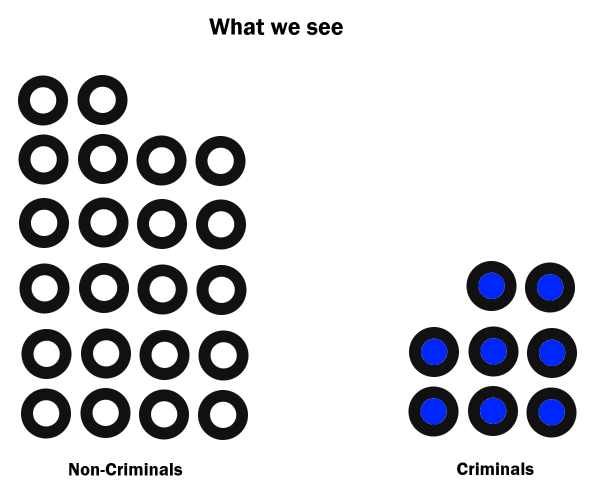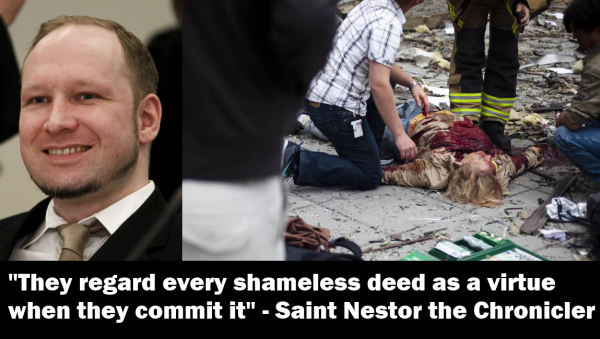At the core of rightist thought lies the assumption that social harmony can only exist between people with a common identity, i.e. people with a similar ethnic and/or cultural background. Accordingly, everyone else is seen as a potential threat to group cohesion. To justify this assumption, rightists will claim, at least implicitly, that their own group is superior to other groups and that therefore, all outside influence is inherently negative. As a result, rightists determine the value of a person not by her character and her capabilities, but by the presumed value of the group she belongs to. Thus, identitarianism is born.
There are two ways in which identitarians try to prove that other groups are inferior. The first one consists of comparing average values of different groups, usually using indicators such as IQ or crime rates. The overall sketchiness of these statistics aside, it is important to remember here where average values come from. An average value is calculated by adding all individual values and dividing them through the sum of the values measured. Even in cases where this does in fact hint at certain tendencies within a group, it still says nothing about the individual persons that comprise it. Individual scores can diverge greatly from the average, both above and below.
The only thing average values actually do is masking the differences that exist within each group. The gulf between a criminal and a non-criminal is just as large in a group with a relatively high proportion of criminals as it is in a group with a low proportion. Likewise, the IQ of a low scoring person is not going to increase due to the fact that her group has a high average score and vice versa. It is here that the absurdity of identitarian “logic” becomes visible in all its twisted glory. From an identitarian point of view, a criminal could claim superiority over a non-criminal because the crime rate in his group happens to be lower than the crime rate in the group of the non-criminal!
The second way consists of boasting with all the accomplishments made by persons who happen to belong to the own group. Identitarians will stress at any given opportunity that such a brilliant mind could only come from the ranks of their group, effectively attributing the persons’ accomplishments to their background instead of their own genius. At the same time, accomplishments made by no less brilliant persons who happen to belong to other groups are denigrated. After all, identitarians could not care less about the accomplishments themselves, nor about the persons responsible. All that matters about a particularly gifted person is that she belongs to the right group and will thus increase its prestige.
That way, identitarians not only manage to degrade the high quality persons of other groups, but also the high quality persons of their own. Instead of being treated as brilliant in their own right, they are portrayed as merely an expression of their group’s supposed superiority. This means that the entire rest of the group, even its lowest elements, can claim the achievements of their best and brightest as their own. Of course, this principle will be turned on its head whenever convenient. When another group is concerned, it is its extraordinarily low quality members that will be portrayed as an expression of that group’s supposed inferiority and all members, even its best and brightest, go on trial with the persons in question.
The only personal trait identitarians truly admire is egotism. Identitarians idolize people who pursue the self-interest of their group relentlessly, regardless the moral cost. Despite all their talk, they do not care about actual inferiority or superiority at all. The only thing important is that their group ends up being on top, no matter how much they will have to debase themselves towards that end. In accordance, the people they hate the most are those who put their conscience over their group’s self-interest and will go against it once they realize that pursuing them will result in immorality. In this way, identitarianism does in fact select for exceptionally low quality persons, which makes the boastfulness described above even more absurd.
The false left is countering identitarianism in the worst possible way, namely by asserting that there are no differences between people at all and that therefore, everyone should be treated the same. As a result, they will often lapse into identitarian patterns themselves when they view a group as not being treated equally enough. False leftists fall for the communist fallacy that the oppressed are automatically good and will never become oppressors themselves once they are in power. As a consequence, they will simply champion the self-interest of the group they deem to be the most oppressed instead of finding a way to unite people across ethnic, cultural or social fault lines, ignoring that they may give rise to a new kind of tyranny.
Both the identitarian right and the egalitarian left have found ways to obscure the best and give cover to the worst segments of society, either in the name of group-based self-interest or equality. As True Leftists, we cannot but shudder at the mere thought of this unfairness. While we acknowledge that human equality is a lie, we also challenge the notion that superiority or inferiority is tied to membership in one of the many arbitrarily drawn groups our societies are carved up into. In truth, no two people are the same, whether they belong to the same group or not. In line with this view, we seek social harmony by uniting the best each group has to offer. Likewise, we strive for a fair society by treating everyone according to what they have to offer in terms of character and capabilities. This is what we call social justice.





“At the core of rightist thought lies the assumption that social harmony can only exist between people with a common identity, i.e. people with a similar ethnic and/or cultural background. Accordingly, everyone else is seen as a potential threat to group cohesion.”
I think we need to distinguish between two movements here: so-called “race realists” (ie. racial tunnel-visioners) and identitarians. “Race realists” say what you describe: that multiethnic social harmony would indeed be a wonderful thing if it could exist, but unfortunately it cannot and never could, so we should stop trying to achieve the impossible. Identitarians, in contrast, say that multiethnic social harmony would be a terrible thing if it were to exist (because it would lead to destruction of the old identities via interethnic marriage), therefore we should not risk giving it the chance to occur. The identitarians actually believe – and fear – that multiethnic social harmony is possible and likely, which is why their activism involves deliberately sabotaging it. The threat of multiethnic society in their minds is not to group cohesion, but to identity itself.
According to my observations, the “race-realist” camp includes some former False Left people disppointed by the failure of liberalism to deliver the multiethnic social harmony that it promised to deliver (and hence who might be salvageable if we can introduce them to True Left worldview in time), whereas the identitarian camp is thoroughly rightist.
LikeLiked by 1 person
I’ve also noticed that some “race realists” are merely dissatisfied with the “unscientific” way which PC treats biological differences between people. They end up reinforcing traditional Eurocentric ethnic categories, and inevitably gobble up the news articles about “race x has crime-causing DNA!” But I do not think the group I describe originally had political motives.
Also I noticed an error in the article: the “privileged” and “underprivileged” labels should be switched in the image.
LikeLike
@90sretrofan
“The identitarians actually believe – and fear – that multiethnic social harmony is possible and likely, which is why their activism involves deliberately sabotaging it. The threat of multiethnic society in their minds is not to group cohesion, but to identity itself.”
Excellent point. Just another thing that highlights the similarities between identitarians and Jews – unity across ethnic, social and other denominational lines is their greatest nightmare.
@Solaire of Astora
“Also I noticed an error in the article: the “privileged” and “underprivileged” labels should be switched in the image.”
I used the same template for the crime- and the privilege graphs to save time. If you think this resulted in inaccuracies, please point them out to me.
LikeLike
“High crime rate” should correspond with “underprivileged” and “low crime rate” should correspond with “privileged”.
LikeLike
actually, seeing the world in terms of “criminals” “non-criminals” is almost definitely identitarian essentialism. Try again. try “crime” as a nebulous environmental cloud shifting and overlapping with “people” as vessels.
LikeLike
@biddefordroutes
Son of Troy was not arguing above that there is no such a thing as an essence and that identitarians are wrong for claiming that there is. Rather his dispute with identitarians is about the character of that essence, challenging their claim that people of a certain ethnic group are essentially the same. He does this by pointing out that individuals within a group can be essentially different from others in that group, and essentially similar to those of other groups. There are good and bad people in every ethnic group, and we want to unite the good ones. To do this requires treating individuals as individuals, not as group-members.
“try “crime” as a nebulous environmental cloud shifting and overlapping with “people” as vessels.”
Seeing criminality as a “nebulous environmental cloud” leads to similarly nebulous answers when asked why people raised in similar environments and living in similar circumstances can act differently – some criminally, some heroically – in similar situations and have different personalities overall – some criminal, some heroic. Furthermore, disregarding individual quality in order to view everyone as “people” (or part of some broader, uniform “humanity” more precisely) is still essentialist. While environment is important in shaping an individual, and there are important similarities between all humans, I won’t disregard something even more important: their individual quality and individual will. I hope you will do the same.
LikeLiked by 1 person